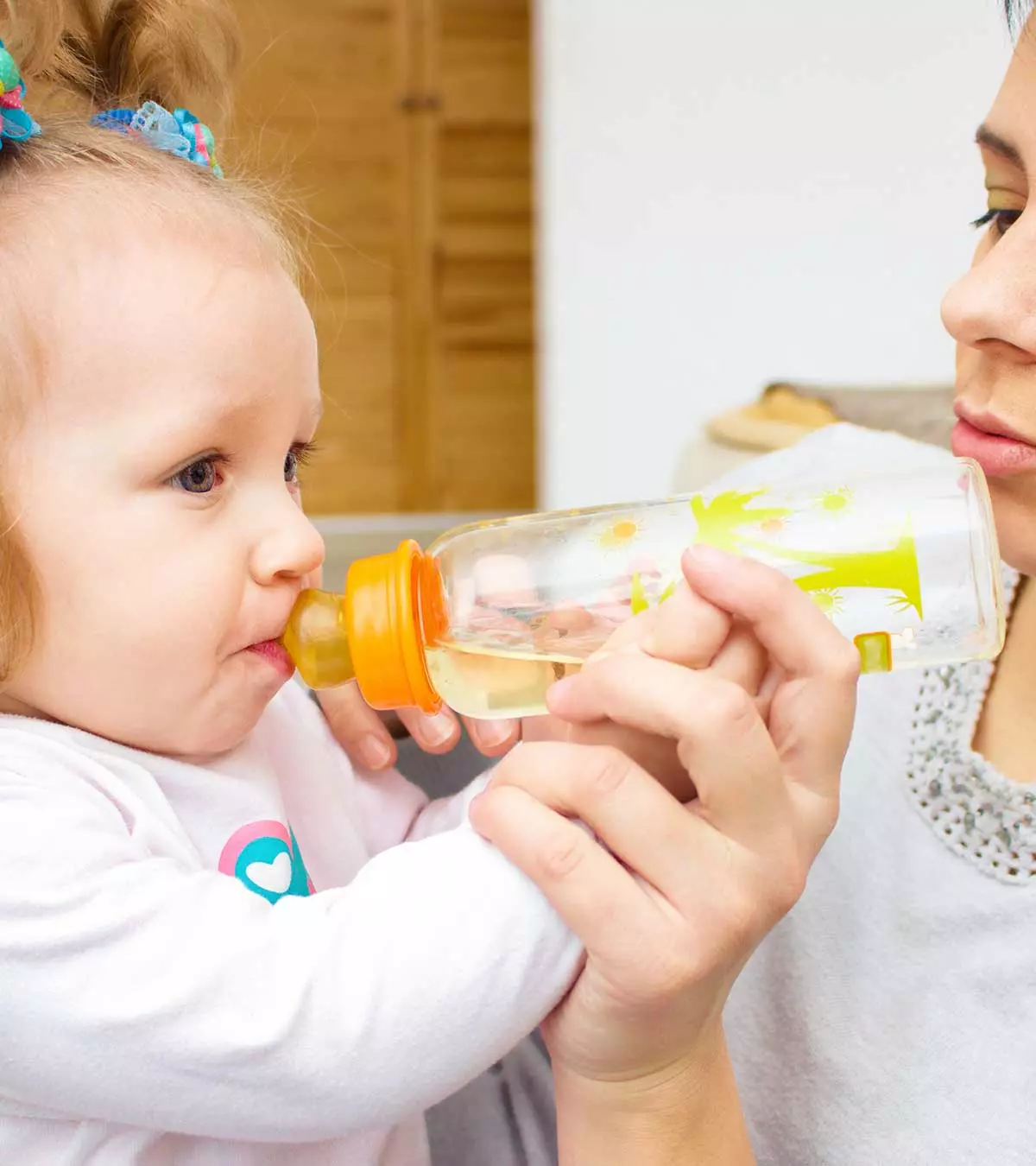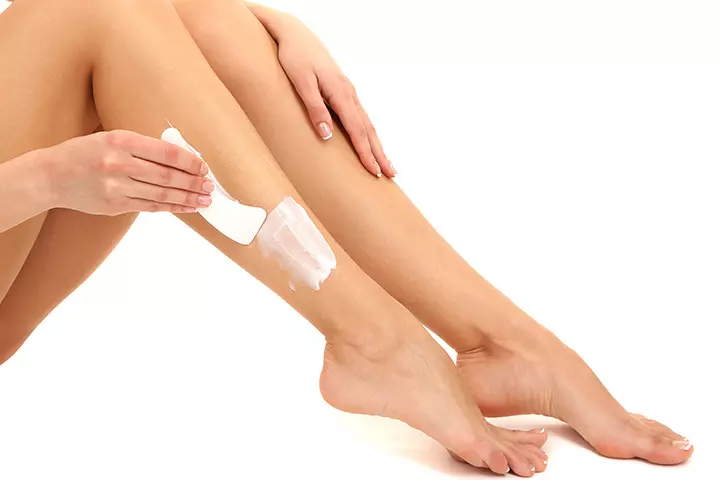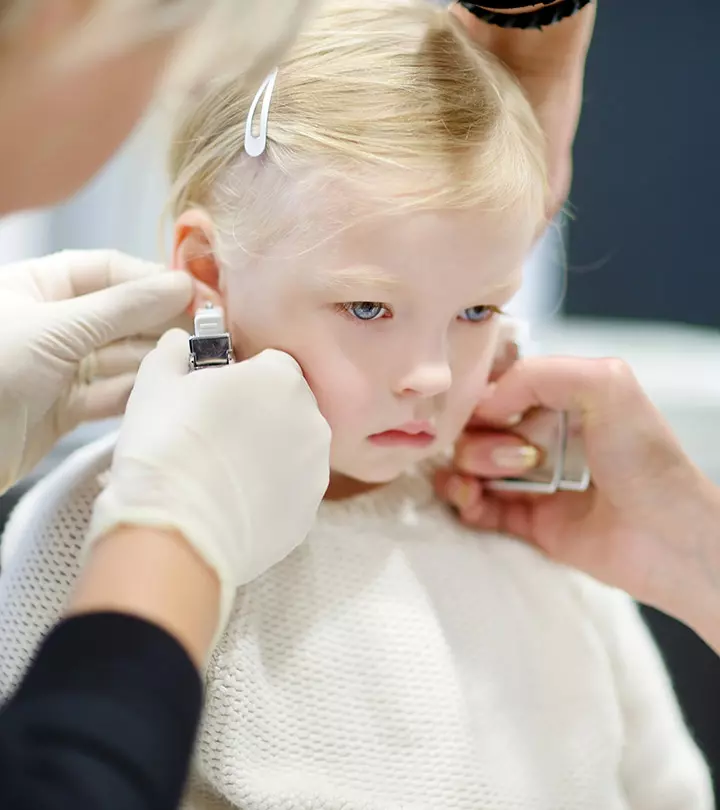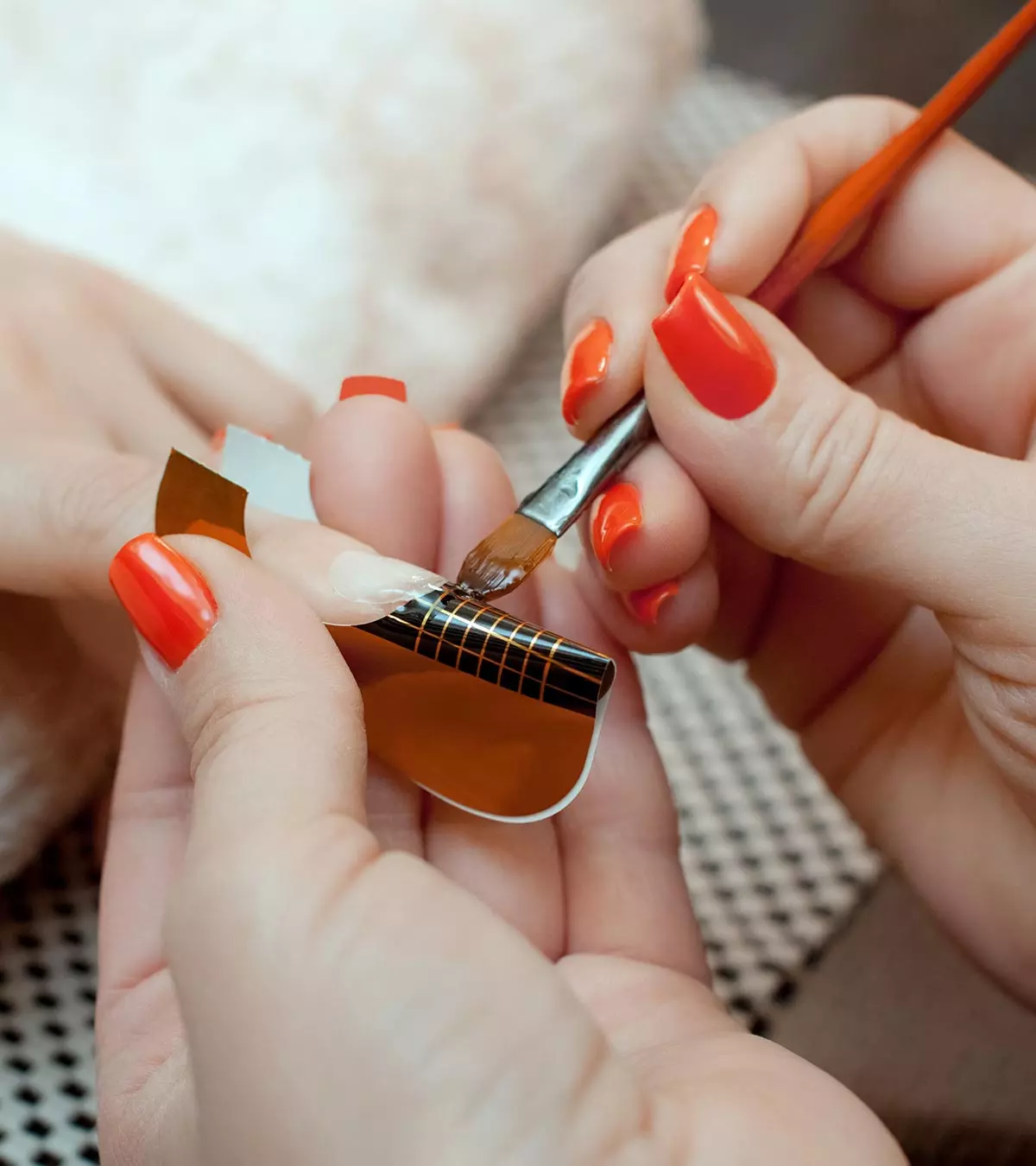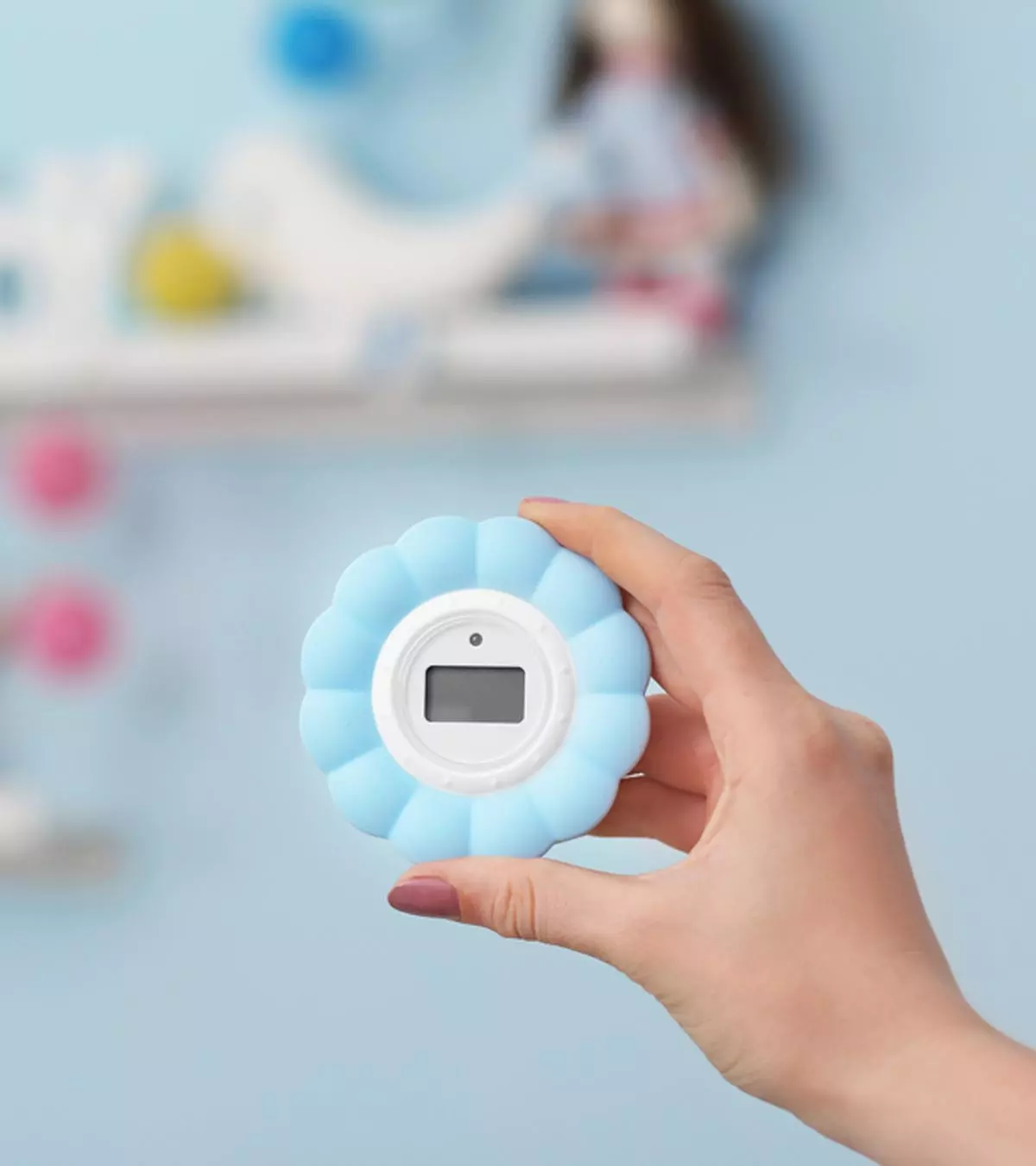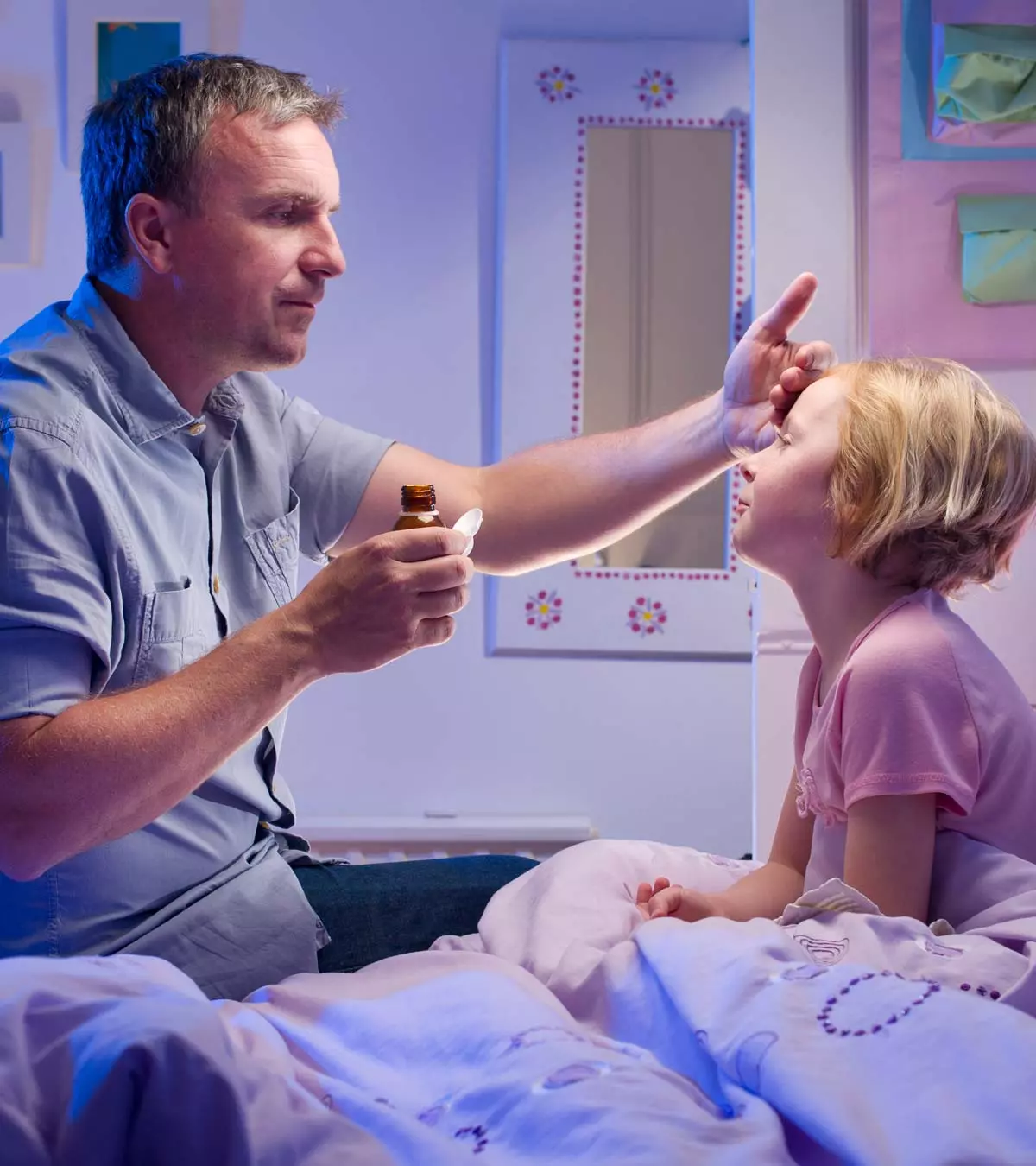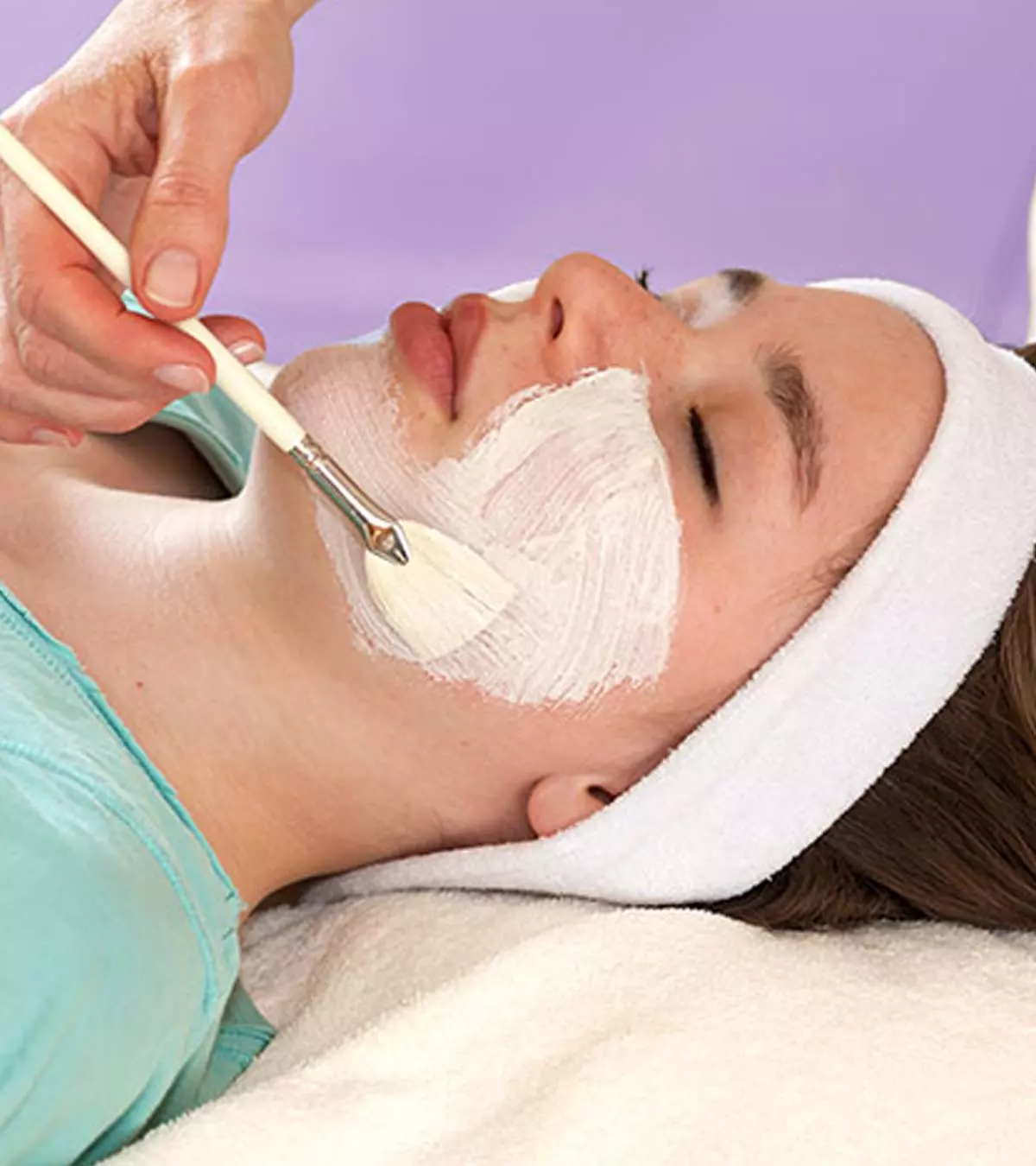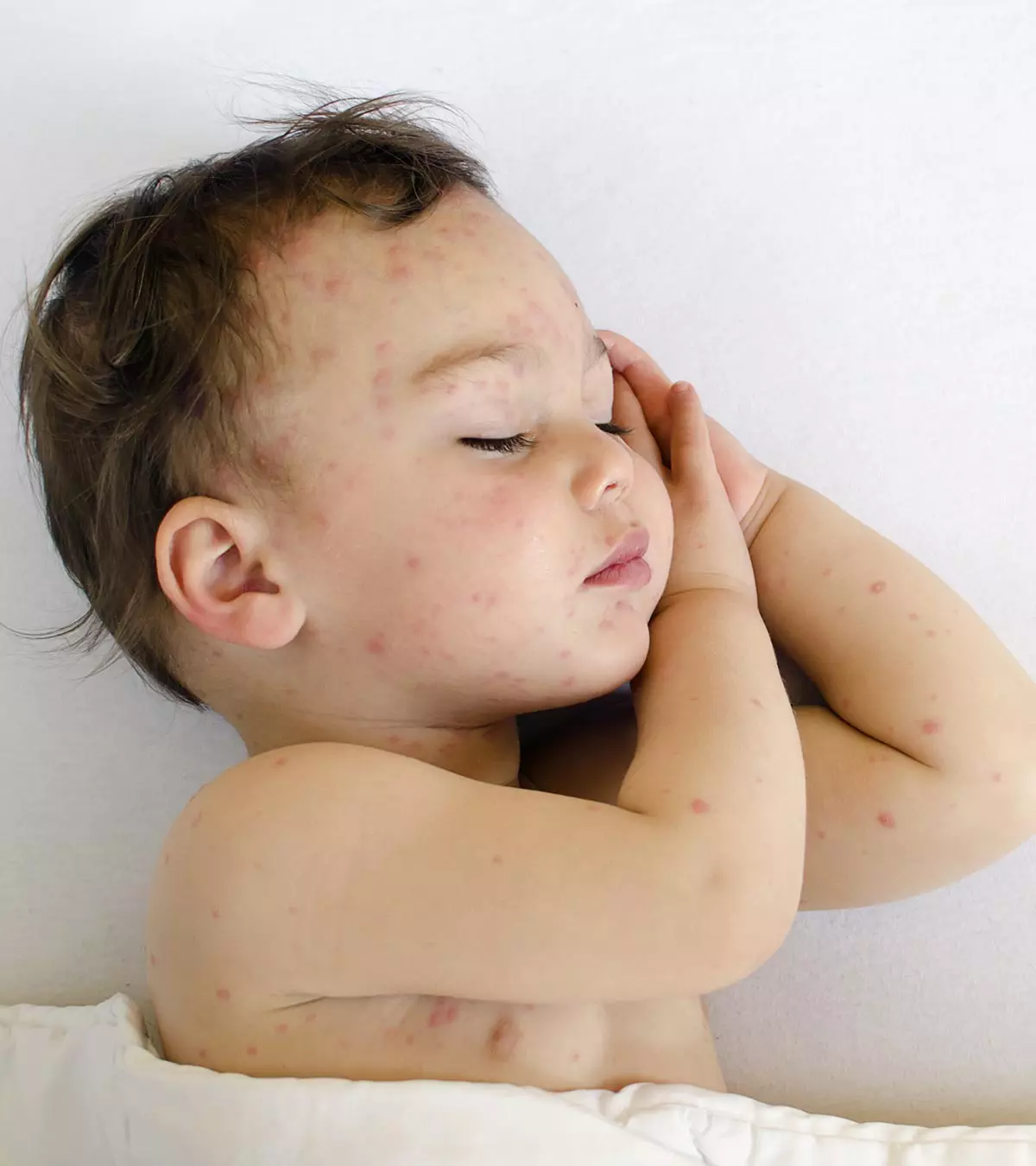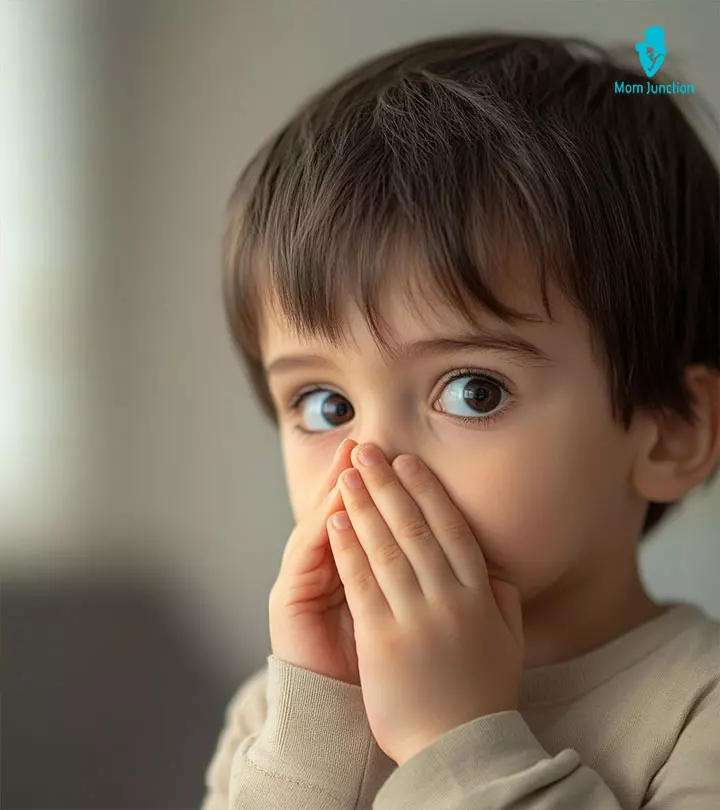
Image: Midjourney/ MomJunction Design Team
Body odor or bromhidrosis is the unpleasant or foul smell produced by the breakdown of the acids in the sweat by bacteria (1). Though it is common in adults, body odor in toddlers is uncommon because they don’t have sufficient fatty acids and ammonia in their sweat, which can trigger bacterial action. Yet, a toddler may develop body odor due to several reasons.

For instance, if body odor occurs in places like armpits, it could indicate an underlying illness. In some toddlers, armpit odor may develop due to bacterial overgrowth or an underlying infection (2). Keep reading to understand the symptoms, causes, treatment, and prevention of body odor in toddlers.
Key Pointers
- The bacterial breakdown of the acids in sweat results in body odor, also known as bromhidrosis.
- Although rare, bacterial overgrowth or an underlying infection might cause body odor in children.
- Additionally, some diets, hyperactive sweat glands, parasites, and unusual metabolic diseases may contribute to body odor in toddlers.
- Pungent odors, especially in the armpits or other regions of the body, are signs of body odor in children.
- Teaching toddlers basic hygiene skills, taking regular baths, cleaning bedding and clothing, avoiding specific foods, and contacting a dietician are all ways to prevent body odor in kids.
Is Body Odor Normal In Toddlers?
Body odor in children who have not reached puberty is not uncommon. However, research studies on prepubescentiThe stage of development before puberty children with body odor are limited (3). Thus, the American Academy of Pediatrics recommends paying attention to body odor among children who have not yet reached puberty (4).
What Causes Body Odor In Toddlers?
Apart from bacterial infections, a few other factors could contribute to body odor in toddlers (2).
- A few toddlers may have body odor after eating certain foods like non-organic dairy products, meat, eggs, and spicy food.
- It may also be due to the presence of parasites in the body.
Infographic: Personal Hygiene For Toddlers
Some thing wrong with infographic shortcode. please verify shortcode syntax- Excessive sweating in toddlers in toddlers may rise from a condition called hyperhidrosis, which causes their sweat glands to become hyperactive (5). This leads to increased body odor and wetness.
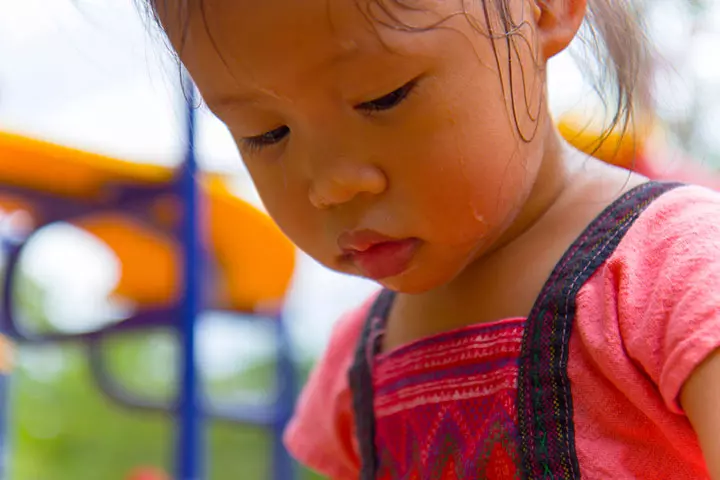
Hayley, a mother, shares her experience with her daughter Jess, who was diagnosed with hyperhidrosis. She says,” Our daughter Jess was diagnosed with hyperhidrosis at 10 months old. We first noticed the excessive sweating of her hands and feet at around four months old. As we were having a heat wave here in the UK, we automatically put it down to the weather and her being a baby. We kept her cool, hydrated, etc. However, it was then that we noticed there must be more to it, as the sweating continued. Doctors here had never known a child so young to suffer from this condition. It took a lot of our own research and frequent trips to see medical professionals before they finally diagnosed her with hyperhidrosis (i).”
- A rare condition called ‘fish odor syndrome’ may cause a fishy smell in the person’s breath, urine, and sweat (6). It is a result of genetic abnormality, and the stench may or may not be noticed immediately after birth.
 Quick fact
Quick fact- A rare cause of body odor is heavy metal toxicity. The Centers for Disease Control and Prevention (CDC) states that children are more prone to lead (a heavy metal) exposure, with an estimated 500,000 children in the US having blood lead levels (BLLs) equal to or exceeding the blood lead reference value (BLRV) of 3.5 micrograms per deciliter (µg/dL) (7). In case of heavy metal toxicity, your toddler’s breath may carry a noticeable garlic-like smell (8). A naturopathiciA holistic approach to healthcare that utilizes natural therapies and the body's ability to heal itself doctor may do a mineral test and heavy metal toxicity test just to rule out the chance of metal toxins in your toddler.
- Rare metabolic disorders may cause armpit odor in prepubescent children, as the body may not be able to generate enzymes required to break down chemicals in the body. Examples of a few such disorders include:
- Phenylketonuria is a condition where the body cannot break down phenylalanine, an amino acid present in food. The phenylalanine builds up, causing a strong body odor (9). Consuming less protein can help control body odor.
 Did you know?
Did you know?- If your toddler has Trimethylaminuria, a metabolic disorder, they may emit an unpleasant odor similar to that of a rotting fish (10).
- If the toddler has Tyrosinemia type 1 or methionine malabsorption metabolic disorder (11), they may have a distinct cabbage-like smell.
- If your toddler has Diabetic ketoacidosisiA severe health condition characterized by abnormally high levels of ketone bodies in the serum and urine there is a chance that they will have a distinct breath (12).
 Quick fact
Quick factIn addition to the above-mentioned causes a lack of hygiene, increased physical activity, and hot weather also may contribute to body odor in toddlers (13).

Symptoms Of Body Odor In Toddlers
It is easy to discern if your little one suffers from body odor, as the smell is distinctive. Common symptoms include (14):
- Pungent odors
- Localized odor such as in the armpits, neck, feet, or other parts of the body.
- In some cases, the presence of body odor might be accompanied by redness or irritation in the affected areas.
Consult your doctor if body odor appears alongside other symptoms, such as fever, rash, or unusual behavior, it could indicate a more serious condition that warrants medical attention.
Prevention Of Body Odor In Toddlers
Take these simple measures to put body odor at bay (15) (16).
- Teach your toddler basic hygiene and help them keep themselves clean.
- Bathe your child every morning and evening.
- Choose breathable fabrics for clothing and ensure toddlers wear clean clothes daily.
- Always use fresh, clean socks for comfort and hygiene.
- Select open sandals that allow proper airflow.
- Regularly launder their bedding and clothes to prevent the building up of microbes, and thereby odors.

- Avoid offering foods like non-organic milk, meat, spicy meals containing garlic, chilies, and onions to lessen your little one’s odor problems.
- Applying special antiperspirant aluminum chloride (Driclor) on your little one’s feet may reduce perspiration. However, consult a doctor before using it. Ms Hayley says, “She (her daughter) was prescribed Driclor solution, which she hated as it is a liquid solution, which has to soak into the skin and can take some time to dry.”
- You can try a DIY disinfectant by adding a spoonful of vinegar to 8-ounce water. Mix well and put this mix in a spray bottle. This mix can safely be used as a disinfectant to spray the skin in the shower and then rinse it off. To stay alert on any possible reactions, do not forget to do a patch test before using the product. Other home remedies for managing body odor include lemon juice, green tea, and baking soda (17). Always consult your pediatrician before using any of these on your toddler’s skin to ensure they are safe and appropriate.
- You may also consider consulting a dietitian and check for a list of foods that your toddler can avoid.
If your toddler has persistent body odor despite good hygiene, or if it is accompanied by other symptoms like fever or unusual behavior, you may want to consult your pediatrician.
 Trivia
TriviaTreatment Of Body Odor In Toddlers
Treatment becomes easy once the underlying cause of body odor is identified (17) (18).
- If body odor is the result of a bacterial infection in the baby, the doctor may prescribe an antibiotic course to clear the odor-causing bacteria.
- The doctor may also check for any parasites in your toddler. Once the type of parasite causing body odor is diagnosed, you may proceed with subsequent treatment.
Frequently Asked Questions
1. Can we use mild deodorant for toddlers?
It is advisable to talk to your toddler’s doctor before using any deodorant or perfume to tackle the odor. The doctor might suggest using a mild deodorant for your toddler without antiperspirant.
However, products containing baking soda, sage tea, diluted apple cider vinegar, natural baby wipes, diluted essential oils, and natural deodorant crystals are safer to use for toddlers rather than chemical deodorants. Even before using natural substances like essential oils and fragrances on your little one’s skin, be careful and ensure to test it on a small area on the leg or arm initially, to avoid allergic reactions.
2. When does a child generally begin to show body odor?
Typically, body odor does not occur until a child hits puberty. If a child experiences it earlier (before eight years in girls and before nine years in boys), it is considered as early puberty or precocious puberty. During this period, the underarm odor can be noted in children.
3. Why do my toddler’s armpits smell like onions?
According to Dr. Erum N. Ilyas, MD, MBE, FAAD, a Pennsylvania-based board-certified dermatologist, “The bacteria most often linked to body odor include Staphylococcus species, such as hominis and epidermidis as well Cutibacterium avidum.
Staphylococcus hominis is prevalent in the neck folds, under the arms, and inguinal folds of children and is linked to acetic acid production resulting in a sour odor. The bacteria also produce sulfur, creating an odor similar to onions.”
4. Which soap is best for body odor in toddlers?
Although various antimicrobial soaps are available on the market, it is ideal to use an expert-recommended mild (non-irritating) bathing soap for your toddlers to help prevent adverse skin reactions (19).
5. Can probiotics help body odor in toddlers?
Probiotics enhance gut health and immune function in young children (20), but there is not much evidence that they help reduce body odor.
6. Can dehydration cause body odor?
There needs to be more research to prove this. In contrast, studies demonstrate that dehydration may lead to a delay in sweat production (21).
Body odor in toddlers is not common as in adults. The causes for body odor in toddlers may range from something as simple as what they eat to some more serious conditions such as metal toxicity, etc. Certain hygiene measures such as regular washing and bathing, wearing clean garments, regular changing of bedding, etc., can help prevent bad odor. Do not hesitate to consult your child’s doctor if you have any doubts regarding the reasons for the strong body odor in your toddlers.
Personal Experience: Source
MomJunction articles include first-hand experiences to provide you with better insights through real-life narratives. Here are the sources of personal accounts referenced in this article.
i. This 5-year-old has hyperhidrosis.This Five-Year-Old Has Hyperhidrosis
References
- Body odour (bromhidrosis).
https://www.nidirect.gov.uk/conditions/body-odour-bromhidrosis - What Causes Bromhidrosis?
https://pediatriceducation.org/2009/05/11/what-causes-bromhidrosis/ - Tze Hau Lam et.al; (2018); Understanding the microbial basis of body odor in pre-pubescent children and teenagers.
https://pmc.ncbi.nlm.nih.gov/articles/PMC6267001/ - Odor (Unusual Urine and Body) (Chapter 180).
https://publications.aap.org/pediatriccare/book/348/chapter-abstract/5774398/Odor-Unusual-Urine-and-Body-Chapter-180?redirectedFrom=fulltext - Hyperhidrosis.
https://www.rileychildrens.org/health-info/hyperhidrosis#:~:text=The%20body’s%20way%20of%20cooling,the%20armpits%20and%20the%20feet. - Trimethylaminuria (Fish Odor Syndrome).
https://my.clevelandclinic.org/health/diseases/22356-trimethylaminuria-fish-odor-syndrome - About Childhood Lead Poisoning Prevention.
https://www.cdc.gov/lead-prevention/about/?CDC_AAref_Val=https://www.cdc.gov/nceh/lead/overview.html - Heavy Metal Poisoning.
https://rarediseases.org/rare-diseases/heavy-metal-poisoning/ - Phenylketonuria.
https://medlineplus.gov/genetics/condition/phenylketonuria/ - Trimethylaminuria.
https://medlineplus.gov/genetics/condition/trimethylaminuria// - Tyrosinemia.
https://www.newbornscreening.info/tyrosinemia/ - Diabetes & DKA.
https://diabetes.org/about-diabetes/complications/ketoacidosis-dka/dka-ketoacidosis-ketones?referrer=https%3A//www.google.co.in/ - Body odour (BO).
https://www.nhs.uk/conditions/body-odour-bo/ - Is My Child’s Stinky Funk Normal?
https://healthcare.utah.edu/the-scope/kids-zone/all/2025/03/my-childs-stinky-funk-normal#:~:text=This%20smell%20is%20due%20to,can%20smell%20from%20then%20on. - Body odour.
https://healthify.nz/health-a-z/b/body-odour/ - UK HealthCast: Body odor in children.
https://ukhealthcare.uky.edu/wellness-community/blog/uk-healthcast-body-odor-children - Body Odor.
https://my.clevelandclinic.org/health/symptoms/17865-body-odor - Tanja Schlereth et.al; (2009); Hyperhidrosis—Causes and Treatment of Enhanced Sweating.
https://pmc.ncbi.nlm.nih.gov/articles/PMC2695293/ - Bathing Your Baby.
https://www.nationwidechildrens.org/family-resources-education/health-wellness-and-safety-resources/helping-hands/bathing-your-baby - Linda P. Guamán et.al; (2025); The Impact of Bioactive Molecules from Probiotics on Child Health: A Comprehensive Review.
https://www.mdpi.com/2072-6643/16/21/3706#:~:text=Research%20has%20highlighted%20the%20efficacy,to%20child%20health%20and%20development. - Lindsay B Baker; (2019); Physiology of sweat gland function: The roles of sweating and sweat composition in human health.
https://pmc.ncbi.nlm.nih.gov/articles/PMC6773238/ - Microbial Origins of Body Odor.
https://asm.org/Articles/2025/December/Microbial-Origins-of-Body-Odor - Jacob Reinhart; (2019); Early Detection of Diabetic Ketoacidosis by Breathalyzer in a Sailor Reporting for Duty.
https://pubmed.ncbi.nlm.nih.gov/31141143/
Community Experiences
Join the conversation and become a part of our nurturing community! Share your stories, experiences, and insights to connect with fellow parents.
Read full bio of Dr. Murtaza Kamal
- Dr. Erum N. Ilyas is a board-certified dermatologist at Schweiger Dermatology Group. She completed a masters degree in Bioethics/Medical Ethics from the University of Pennsylvania and a Doctor of Medicine from the Drexel University College of Medicine. In her 13 years of experience in the King of Prussia, PA, she has treated more than 30,000 patients.
 Dr. Erum N. Ilyas is a board-certified dermatologist at Schweiger Dermatology Group. She completed a masters degree in Bioethics/Medical Ethics from the University of Pennsylvania and a Doctor of Medicine from the Drexel University College of Medicine. In her 13 years of experience in the King of Prussia, PA, she has treated more than 30,000 patients.
Dr. Erum N. Ilyas is a board-certified dermatologist at Schweiger Dermatology Group. She completed a masters degree in Bioethics/Medical Ethics from the University of Pennsylvania and a Doctor of Medicine from the Drexel University College of Medicine. In her 13 years of experience in the King of Prussia, PA, she has treated more than 30,000 patients.
Read full bio of Swati Patwal
Read full bio of Rohit Garoo
Read full bio of Shinta Liz Sunny









